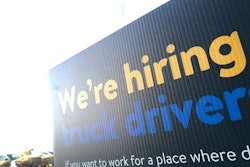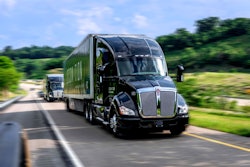Trucking news and briefs for Thursday, May 26, 2022:
Arkansas police, trucking industry working to ease CDL testing backlog
The Arkansas Trucking Association and Arkansas State Police are working together to help ease a backlog of would-be commercial driver’s license holders waiting to complete their skills tests.
As with non-commercial driver’s license testing, professional truck drivers must pass both a written and a skills test to obtain their CDL. Staffing issues and a limited number of test sites have sidelined CDL candidates who have been forced to wait weeks to complete the skills test.
“Our industry desperately needs more safe and qualified drivers to be able to stock grocery shelves and deliver all of life’s essentials,” said Arkansas Trucking Association President Shannon Newton. “With ongoing supply chain and workforce issues, delaying the certification of fully-trained drivers impacts everyone — not just trucking.”
After being notified of drivers facing weeks-long delays between completing their CDL training and being able to take the CDL skills test, Newton approached the Arkansas State Police to find a solution. Together, the ASP and ATA came up with a multi-pronged approach to streamline the backlog, including:
- Saline County Fairgrounds will provide temporary overflow testing beginning May 31, running for 45 days
- CDL examiners have been approved for overtime through the end of June
- CDL examiners have been directed to remain dedicated to CDL testing candidates
- ASP is aggressively attempting to fill examiner vacancies with qualified testing personnel
- ASP will consider expanding third-party testing options
“We commend the Arkansas State Police for implementing swift and decisive resolutions to address the backlog of CDL skills tests,” Newton said. “Our economy needs people to go to work and these drivers are ready and willing to do so, with the support of the Arkansas CDL examiners.”
Drivewyze adds cargo theft ‘hot spot’ alerts
Drivewyze has teamed up with cargo theft analytics firm Verisk to provide Cargo Theft Alerts as a value-added feature in its Safety+ service.
Drivewyze Safety+ is an in-cab product that provides context-based, proactive, customizable, driver safety notifications through existing ELDs or telematics devices.
The theft “hot spot” alerts are available thanks to a collaboration with Verisk, provider of CargoNet. With Cargo Theft Alerts, drivers are notified when approaching one of the top 50 riskiest parking locations and top 50 riskiest counties in the country.
Safety+ will display a driver-safe visual and audible warning through the in-cab ELD or telematics device as they approach these high-risk areas. The alerts are fully automated and require no driver interaction.
Safety+ high-risk areas will be updated regularly based on the latest data from CargoNet. Subscribers will also receive Daily Hot Theft Zone Alerts, powered by CargoNet, to be informed on the latest incidents of cargo theft throughout the U.S. and Canada.
CargoNet’s database receives and integrates cargo theft data from law enforcement, insurers, transportation companies, manufacturers and retailers.
Drivewyze Safety+ is a premium subscription service available on more than 2.5 million ELD devices. Safety+ subscribers can receive a heads up on high-citation areas for speeding, upcoming parking availability in select states, and high-risk areas for cargo theft. In addition, fleet managers can create customized driver safety alerts, access driver behavior analytics, and manage fleet risk.
Fleetmaster Express adding 10 electric Volvos to fleet
For-hire carrier Fleetmaster Express has ordered 10 Volvo VNR Electrics to support supply chain sustainability efforts for Ball Corporation, a global provider of recyclable aluminum beverage packaging.
Fleetmaster Express will begin operating its first two battery-electric trucks in Q2 2022, making them the first Volvo VNR Electric trucks to operate in Texas. The eight additional Volvo VNR Electrics will be delivered in early 2023.
“It is fantastic to see our three brands unite around the common goal of making the world a better place to live,” said Peter Voorhoeve, president, Volvo Trucks North America. “We commend Fleetmaster Express and Ball Corporation for their commitment to sustainable operations with the integration of the first Class 8 battery-electric trucks in the state of Texas.”
The Volvo VNR Electric trucks will be used to haul finished aluminum cans on approximately 8-mile runs around Fort Worth from Ball Corporation’s distribution center, averaging 10 to 15 trips per day. To support the charging of its battery-electric fleet, Fleetmaster Express has installed charging infrastructure at its Fort Worth facility.
Fleetmaster Express, founded in 1987 by Bill B. Bumgarner, operates more than 300 trucks and 1,300 trailers with locations in Virginia, North Carolina, Ohio, Arkansas, Texas, Georgia, Indiana, Tennessee and Wisconsin. The two Volvo VNR Electrics are the first battery-electric Class 8 trucks in its fleet.
Volvo adding fossil-free steel to heavy-duty electric trucks
Volvo announced this week it is the world’s first truck manufacturer to introduce fossil-free steel in its trucks.
The steel is produced by the Swedish steel company SSAB, and the heavy-duty electric Volvo trucks will be the first to include it.
The steel from SSAB is produced using a completely new technology based on hydrogen. The result is a much lower climate impact than conventionally produced steel. Small scale introduction of the steel in Volvo's heavy electric trucks will begin in the third quarter of 2022.
"We will increase the use of fossil-free materials in all our trucks to make them net-zero not only in operation – but also when it comes to the materials they are built of," says Jessica Sandström, Senior Vice President Product Management, Volvo Trucks.
The first steel produced with hydrogen will be used in the truck's frame rails, the backbone of the truck upon which all other main components are mounted. As the availability of fossil-free steel increases, it will also be introduced in other parts of the truck.
Volvo says that today, around 30% of the materials in a new Volvo truck come from recycled materials, and up to 90% of the truck can be recycled at the end of its life.












